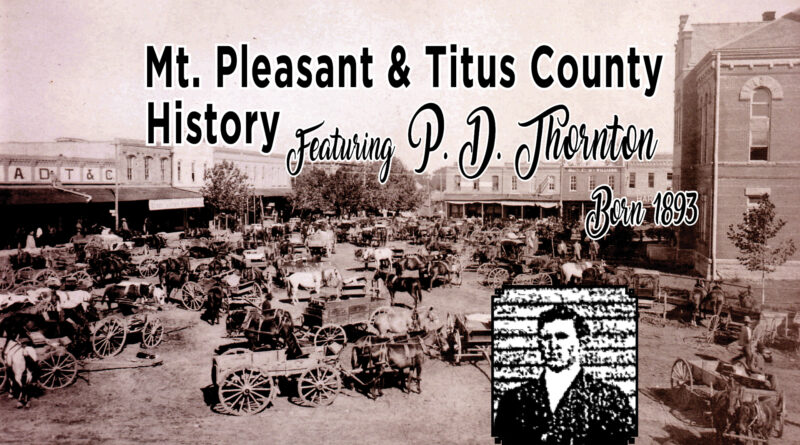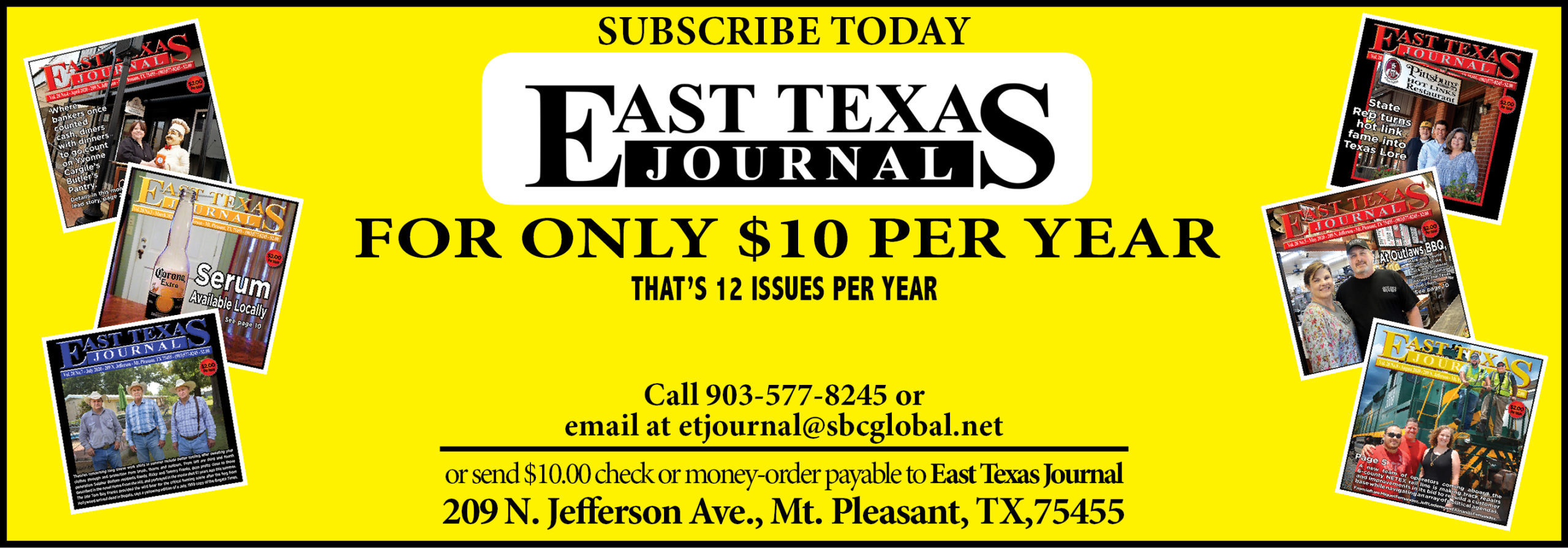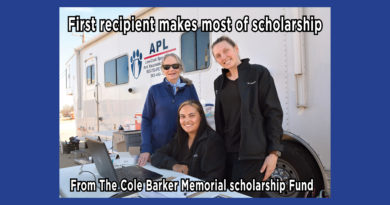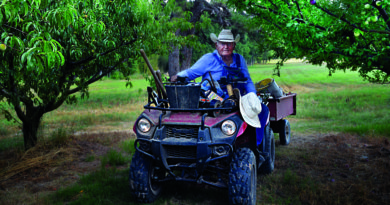P. D. Thornton, Sr
Special to the Journal
Synopsis by Donna K. White from an interview with P. D. Thornton, Sr. in 1979.
I visited with Mr. P. D. Thornton, Sr. at his home at 924 Hubbard Street in Mt. Pleasant, Texas. Mr. Thornton was born October 25, 1893 in Sevier County, Arkansas. He moved to Titus County in the fall of 1916. He moved over on West 10th Street and there wasn’t but one house on that street at the time. He and his wife taught school about 4 or 5 miles out at Union Hill.
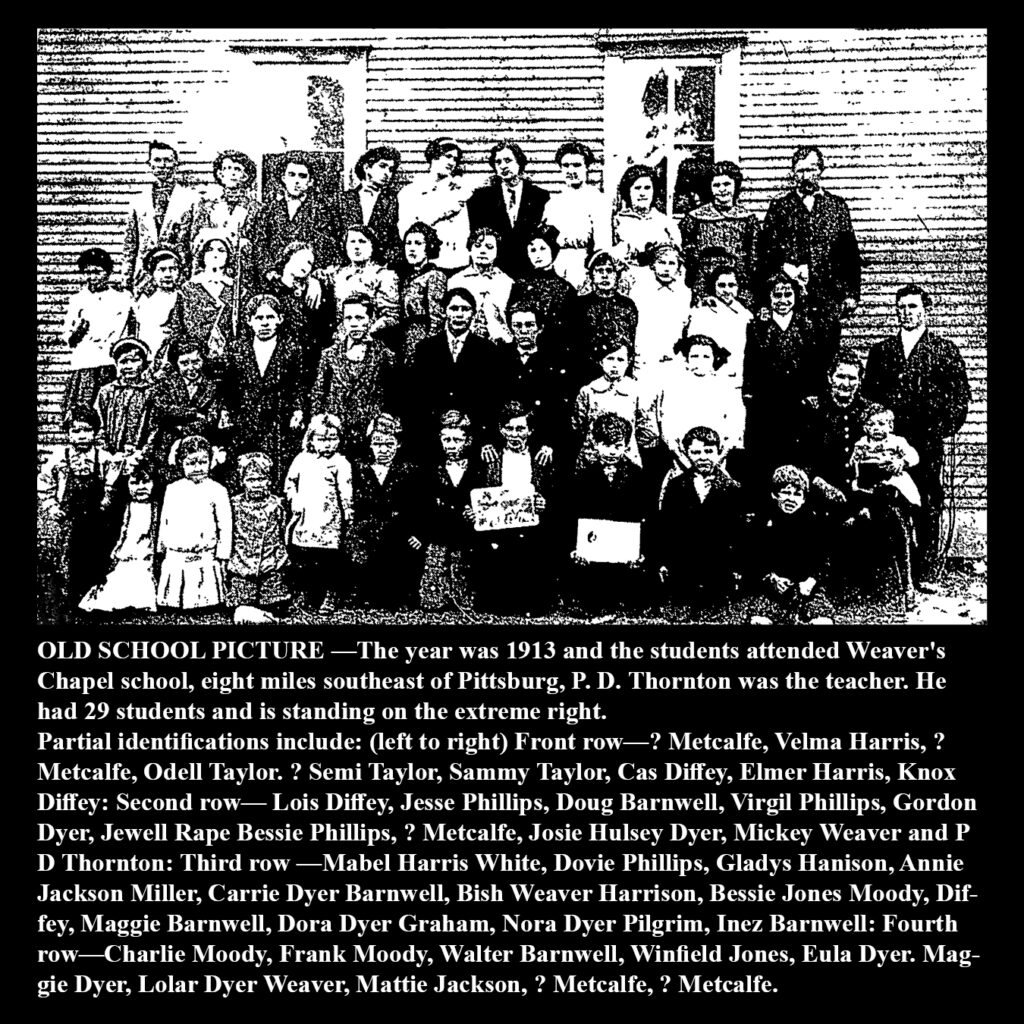
Mr. Thornton was the 149th person in town to own a car. This car was a Model-T Ford Roadster and you cranked it, it didn’t have a starter on it. The way they started that car in the cold weather in the mornings, they had an old oil cook stove and an old iron kettle that they heated their water in and poured it on the manifold to get it hot to where the car would start. And it had a crank on it in the front, all the cars in those days had cranks.
He bought this car on a Sunday, he had never driven a car before. He paid $200 in cash and a horse and a buggy which totaled about $360 or $380. Ira Masters taught him how to guide it. He first ran off of a bank about 2 feet high! So he drove the car to school the next day. And it was really something to have a schoolteacher that had an automobile!
Gomin’ home that evenin’ they were building some roads down by Winfield and you had to go way down in a place and then in and back out. The floorboard where your feet were was not fastened down and they bounced out of place. Mr. Thornton forgot that he wasn’t on a horse so he reached down to fix it and he turned over the car. There were a bunch of hands working on the road that helped him push it back up on the road, so he paid them by letting them ride back to town in the car. It didn’t hurt anything but the windshield, broke it out. To replace the windshield back then cost him $12 and a half.

Around the first of January 1917 or 1918 he resigned teaching school and went into the automobile business. He sold Hupmobiles and Maxwells. He started off selling the Maxwells for $800 and they later went up to $900. They cost him $600. The cars were brought from Burton-Roundtree in Dallas. And there weren’s roads much. They had spent a million dollars in this county a year or two before, they graveled the road from here to Dallas and the only pavement of any kind to Dallas was about a mile or two this side of Greenville and about the same on the other side of Greenville. You didn’t go to Dallas like you do now. You went to Greenville and from there to Farmersville to Plano and on to Richardson and then you went on into Dallas on Ross Avenue. And the way that pavement was it was just wide enough for one car. And about every quarter of a mile or half a mile they had a siding like what they have on the railroad and the car that got there first had to stop and wait for the other one to go on by. To give an idea of how the roads were from here to Dallas, Mr. Thornton left one morning with about 8 or 10 boys and picked up enough drivers in Dallas and they brought back 19 cars. They left Dallas at 8:30 that morning and got to Mt. Pleasant at 2:00 the next morning. The gas tank held 8 gallons maximum and all those cars but two used 5 tanks of gas from Dallas to Mt. Pleasant. They repeated this 2 or 3 dozen times.
Mr, Thornton made a lot of money with the cars in 1918 for those times. He started in with about $200 and by Christmas had about $12 or 15 thousand. He credited everybody and November 11th, of course the war was over and people were living way beyond their means, so he lost quite a bit of money. The Federal Government and Congress passed a ruling that stopped all banks in the United States from loaning money to buy a car, to make a down payment or to even pay for one. Mr. Thornton was selling his cars just like hot cakes. He sold 3 or 4 and had to carry the rest back to Dallas. He had left a deposit of about $150 a car and when he went to payin’ for the cars he just paid the difference between that and the $600, so that took a lot of his money.
One day he sold a car to Miller Hobbs and he had a pretty buggy horse and a nice buggy. He sold him a Maxwell and he bought the horse and buggy for about $185. Mr. Thornton tied the horse to a post and his garage at that time was right where Traylor Russell’s office is today. He tied it up and never did touch the horse or buggy, a feller came a-long and bought it in about an hour.
There was an old-time hardware store located about a block away from Burton-Roundtree in Dallas and they sold Mr. Thornton some big old ropes. He bought 100 feet of it and it was so heavy they cut it half into. So when they come to a mudhole they would tie one end of the front of the rope to the front axle of the car and 10 or 12 boys would get a hold of that thing and rock it and pull it out. And after that first one got through, they would tie that rope on the back axle and would run all the cars through.
Gas was 25 cents a gallon back then. Mobil was the only oil company in town at the time and Audie Havern had that when Mr. Thornton came to town. Later on, he got rid of it and the ex-Sheriff Willie Smith bought it. At that time there were only 4 pumps in Mt. Pleasant. One of them belonged to a feller named Rasler and it was located where the Collegiate Shop is now. But nobody bought gas there, he just bought it for his own use. Mr. Thornton had a gas pump and Wil Ford had one right on 4th and Jefferson Streets. Cap O’Tyson had a pump down there by the Guaranty Bank.
The Hupmobile finally went out of business but the Maxwell is now the Plymouth. Cap O’Tyson had a garage right where they built that new addition to the Guaranty Bank. He sold Overlands and Chalmers.
In 1918 there were 4 trucks in Titus County. Mr. Thornton owned one and Pope Brothers had a lumber yard in Talco. They were Maxwell trucks and you couldn’t puncture the tires because they were solid rubber tires. Jack Langston had a little grocery store there where Legg and Harrison’s is today and he had a T-Model Ford with sideboards about 5 or 6 feet high and that’s what he delivered his groceries in. The Light Company had an old Republic but it had tires like we have today. They were called pneumatic tires and that was the total of trucks here then.
Mr. Thornton went into the Tailoring and Dry-Cleaning business January 29, 1919. His first shop was located where J.L Moses Real Estate office is located on East 3rd Street. He went into the business with $2 in his pocket. He never had pressed a suit or seen one pressed, and never had done an alteration. The first job he ever got was from old man W.M. Smith who owned the old Smith Hotel which was located where West’s store is located today. He brought Mr. Thornton a blue-serge coat to be cut off an inch. So Mr. Thornton went to work on that thing at 8:00 one morning and at 4:00 the next day he had that coat finished. And at 6:00 he came and got it and paid him a dollar and a half. So he made a dollar and a half in 2 days. There were 2 other Dry-Cleaning shops in town at the time. Thrasher’s had one and Jones Delafield had one. Thrasher’s is where it is today and Delafield’s was where Tull -Florey’s is located today. They delivered clothes in those days with a horse and a “hack”. A “hack’ is when they take a buggy and take the seat off and build a thing out of 2 by 4’s and covered it with 8-ounce duck and painted it green. Mr. Thrasher had about this same kind of a rig. He paid about $12 and a half for this rig. There were about 3000 people in town then and the horse did fine, but Mr. Thornton says there is no way a horse could do it today.

In the winter of 1917 and 1918, Mr. Thornton had all the taxis that were in Titus County. He took some fellers up to Argo about 9:00 one night and there were 4 of them. It was cold, about 17 above. They had curtains in the cars then and of course there was no such thing as a heater in a car back then. The roads were awful bad. It wasn’t freezing when they left here but by the time they got to Argo everything was frozen hard as a rock. There was a feller goin’ the same way on horseback. They’d bog down and he had a lariat rope and that was the first time Mr. Thornton learned that a horse could pull more with the horn of a saddle than he could with a harness on! They put that rope to that taxi and rocked it out a half a dozen times between Mt. Pleasant and Argo. They got to Argo at bare daylight. By that time it was so frozen so hard you couldn’t go anywhere.
Back then a tire that would go 5,000 miles was a dandy. Mr. Thornton never even saw a tire go over that!
Back In 1931, Mr. Thornton started a cafe called “Pal’s Camp”. It was located on the Pittsburg Highway along where T.W. Miller’s place is, just this side of Cypress. During the Talco oil boom they really had a business. The first six weeks of the boom, especially. They had a lady hostess, 2 boys on the front, 2 dishwashers, 4 cooks and 14 waitresses. They served fried chicken, bar-be-qued chicken and catfish. They bought every chicken they could buy. During that first six weeks, they bought over 300 dozen chickens and served over 6,000 lbs. of fish. He was in business there for 10 years. You paid 50 cents for a fish dinner and you’d get 3/4 of a lb. of fish, all the onions you wanted, catsup, bread and french fries. Sunday evening was when they had their big crowds. They’d peel 2-100 lb. sacks of potatoes for french fries for Sunday nights. They first started cookin’ on an old wood stove and then on an oil stove, but they wound up with 2 deep fat fryers. Every 12 minutes you could cook 24 fish dinners and every 8-10 minutes you could cook 2 dozen fried chicken dinners.
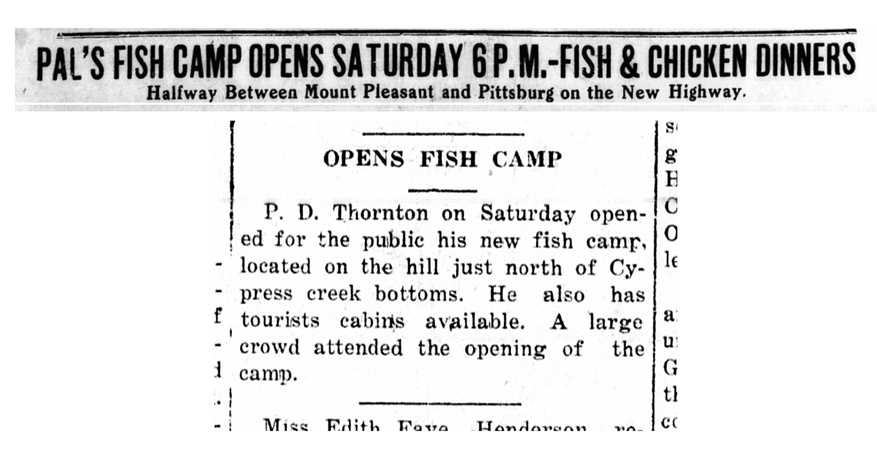
The unusual thing that happened when he had Powell’s Camp was that in the 1930’s outlaws came through. He remembers when “Pretty Boy” Floyd came through. He came right where the fire station is. There was a boarding house there run by old man Bain. Mr. Thornton saw him eat dinner at Hodges Cafe along where the First National Bank is, and so he told the Sheriff and the Sheriff said there wasn’t nothing to it, didn’t want to fool with them, and he never saw him again. He didn’t believe that it was him at the time. But at that time, they had hit oil at Kilgore and there were 2 brothers, the Taylor brothers that were hauling drilling rigs from an oil rig that went dead up at Shawnee, Oklahoma to Kilgore and they hauled them on 2 big trucks. They’d bring 8 or 10 men with them and every time they would come through goin’ and comin’ back, whether it was day or night they would get up and cook them all the fish they could eat. One day one of the boys asked Mr. Thornton if Charlie Floyd had been to see him and Mr. Thornton remarked that he did not know any Charlie Floyd and Mr, Taylor told him that was the one they called “Pretty Boy” Floyd. “Pretty Boy” was working and living at an oil field there in Sallisaw, Oklahoma. Mr. Taylor said he would send “Pretty Boy” to see Mr. Thornton.
They say that “Pretty Boy” got his start because he was having such a hard time making a living, He got to robbing around and would help his family and neighbors, too. So “Pretty Boy” came to see Mr. Thornton and stayed about 30 minutes and a car drove up so he left and went to town and spent the night at that boarding house. Mr. Thornton says that those folks wouldn’t do nothing to you, if you didn’t have anything they wanted, they wouldn’t bother you.
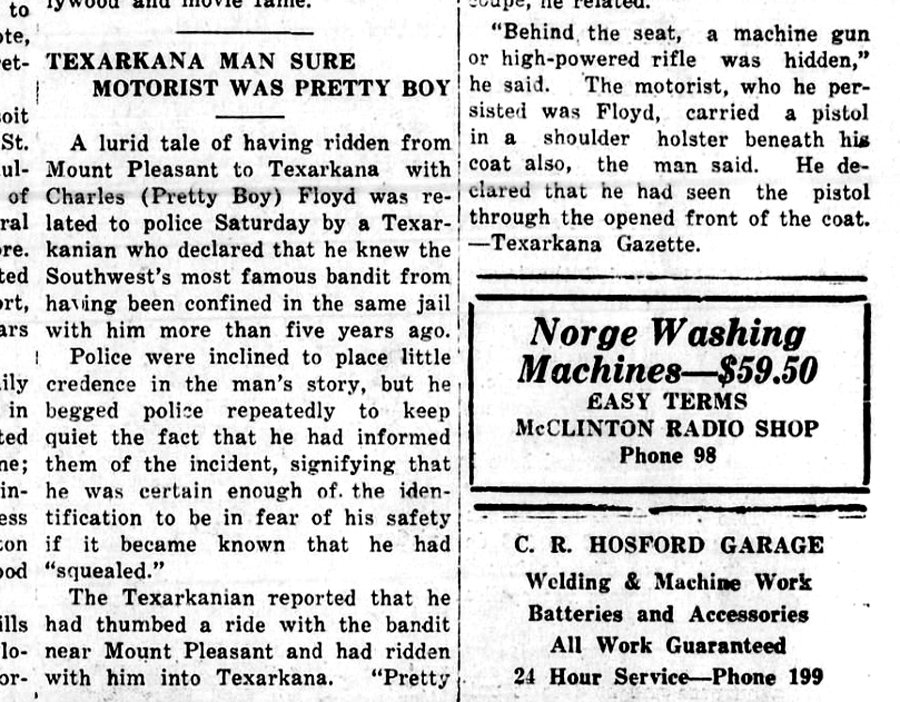
And he remembered very well the day he saw Bonnie Parker and Clyde Barrow, it had been raining that morning and they always got out there about 9:30 or 10:00. But they didn’t get there until 11:00 that day and it was raining. About the time they got a fire in the stove, a car drove up and it was 2 men and 2 women. There was a big feller and a slender feller. So both women and the slender man (Clyde) came in and commenced to playing the slot machines in there. They ordered dinner and the slender man said he didn’t want nothing to eat. So they ordered 3 fish dinners and the big feller was sittin’ in the car, They were driving that green car they got killed in. He says that the gray car they show wasn’t the one they got killed in. Mr. Thornton never thought about them being outlaws, they just acted like anybody else. When they got the dinner ready, the slender man went and got in the car and the other man came and ate dinner. But they didn’t eat up all the fish. So when the other 3 got through, the ”slender” man decided that he would eat something. There was at least one fish dinner left on that table. He ate that and two ham sandwiches and nearly as much as all of them put together. So they went on and left and that was it.
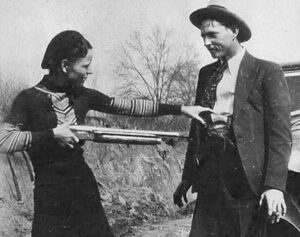
One night they had a big crowd at the “Camp”. Mr. Thornton and Ewell McClinton had been to Dallas and bought a lamp light that lit up the whole place. So a big ol’ maroon Buick Coupe drove up. It had a woman and a man in it. He remembered how that woman was dressed. She had on a hat, the man had on a silk shirt and real fine pair of pants, alligator shoes and belt. They came in there about 9:30 and stayed until they closed at 1:00. He was very nice talking and a very congenial feller. He weighed about 200 lbs., wasn’t very tall, was a handsome feller. His wife was a tall, beautiful woman. He remembered his hair was blonde, but the beard on his face was just as black as it could be. He knew that wasn’t right but never thought much more about it. 2 or 3 days later, old man Penn Brock came up to Pal’s and was a shakin’ all over. He had a Dallas News and there was a picture there of a man and a woman and a car and they had been arrested. Mr. Thornton recognized the building as The Peabody Hotel in Memphis. He then recognized the maroon Buick Coupe and the man and the woman. They had on the same clothes, too. They left the “Camp” that night and had gone on to Memphis. It turned out to be “Machine Gun” Kelly. But they didn’t bother anybody, just tried to get along and have a good time.
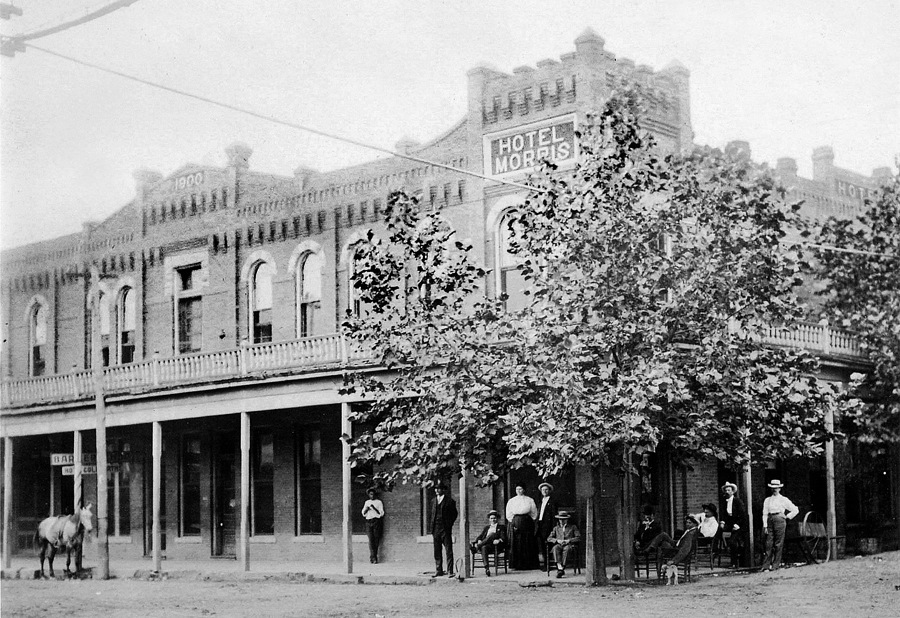
In 1912 where the mall is now, George Lilienstern had a store downstairs and over it was the Morris Hotel. There was a string of chairs that sat on the sidewalk against the wall. He and another feller came over from Pittsburg on the train one night with $2 between them. They stayed up all night for the election. The great election of that time was the Sheriff’s race between John Capper and Green Dickson. Green had been Sheriff about 18 years in one stretch, but they had a rule over the country that after the second term you got out and didn’t run for a third term. But John Cooper ran for a third term. Well, they sat up all night and old man Butler Rolston was District Attorney and old man Green Berry Scoggins bet on: the race. Scoggins bet on Dickson and Rolston bet on Cooper. So at 12:00 all the boxes were in except for Monticello. Green Dickson had never lost Monticello in all the years that he ran for office for years; and years. So they had a meeting out there in front of that 2-story building in Monticello. Mr. Thornton and his wife were sittin’ out there in a double-buggy listening. They didn’t pass out cards like they do now, they’d go to all the communities and speak. Thataway you got to hear them all. So Green Dickson got mad and made some pretty hard remarks against Mr. Cooper and so Green got beat. And that was the only time he was ever beaten running for any office. The last box came in about 4:00 that morning and Cooper won by about 50 votes. So Butler Rolston and Green Berry Scoggins paid their money. They didn’t put it up like they do now. You could trust a man, if a man gave his word, he kept it. So they paid one another. And the loser had to buy the breakfast. Down there by where Moses Real Estate is located on 3rd Street they had a trough with 6 or 8-50 lb. watermelons in it filled up with ice and water. So about 50 of them ate their breakfast of watermelon about 4:30 that morning. Back in those days, when a man gave his word, it was equal to his bond. And if a man’s word was no good, nobody liked him. People back then just kept their word, that’s all there was to it.
Mr. Thornton remembered quite a bit about the way Mt. Pleasant used to be. Back then, this area wasn’t cattle country, it was all cotton and corn and the money crop was all cotton. When he first came to Mt. Pleasant where the east side of Boatner’s Store is, there was a horse lot there and old man Colley had a barn there where you bought, sold and traded horses and mules. The first time he ever went there he saw Floyd Riley there ridin’ a pitchin’ horse. (I interviewed Floyd and he is now 99 years of age and worked with horses all of his life.)
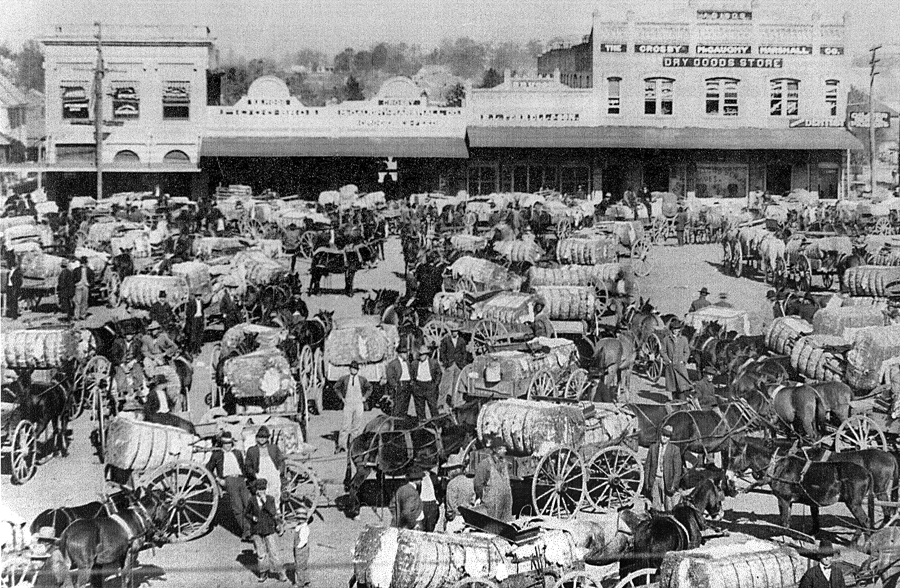
There were cotton gins all over this country back then. Everybody had a gin that wanted one. There were at least 2 in town. The Traylors had one of them and there was one on West 1st and one on Jefferson. Mr. Thornton plowed and hoed more cotton than anybody. They raised corn and cotton all the time. This was where he was raised up 6 and ½ miles northwest of Pittsburg. Mr. Thornton saw hot links get their start in Pittsburg. There was a great big room in the back end of a saloon and there was a horseshoe counter there. They made the hot links there and furnished you with pepper sauce and crackers, all you could eat for a dime. He says that they don’t make them like they used to, just don’t taste the same.
The only drink that you could buy that wasn’t liquor was sarsaparilla or root beer. When he, was a kid growing up in Pittsburg there was a place there where they made soda water. A little Frenchman ran that place. Mr. Thornton told me how soda pop got its’ name. Well in this plant, there was a little crook of a tubing up there and it had a rubber stopper in it and had a little place where you could put something in there and jerk it up. And when they knocked it down, it would pop and that’s how they got the name “soda pop”.
Back in those days, there was one thing you never saw and that was a lawyer’s office downstairs. Up until about 1950. Because the rent was cheaper. Judge Ward was located over where the mall is today and Judge Sam Williams had his office upstairs as did Judge Pounders and others. He believes that the first law office located downstairs here was in 1953 when his son moved here from the valley. Then they all began to move downstairs. He remembered when Judge Ward was District Judge he never got on that bench without a 6-shooter in his pocket, He kept the order.
Mr. Thornton remembered where quite a few places of business were located. Jim Warwick had a bakery located about where the 3rd Street Cafe is today. He made about 100 loaves a day. There were 2 sizes, a small and a large loaf. A small loaf cost a nickel and a large loaf cost a dime. Also on 3rd Street, Clem Gray had a meat market and you’d pay about 10 cents a lb. for the best steak you could buy.
Old man Joe Badt had the only funeral home in town, he had a hearse with tassels and things on it and it was pulled by 2 horses. Old man T. W. Vaughn had a grocery store either right where the Collegiate Shop is or right next to it. He delivered his stuff with a hack and a pair of mules. Up the street J.A. Black had a store and he had two buggies with mules that he delivered with. R. J. Davis was working there and got $15 a week delivering groceries. Rogers Hardware was there where it is today and is the only place in town that has the same name over the front of the store. Old man Bud Rogers ran the store then.
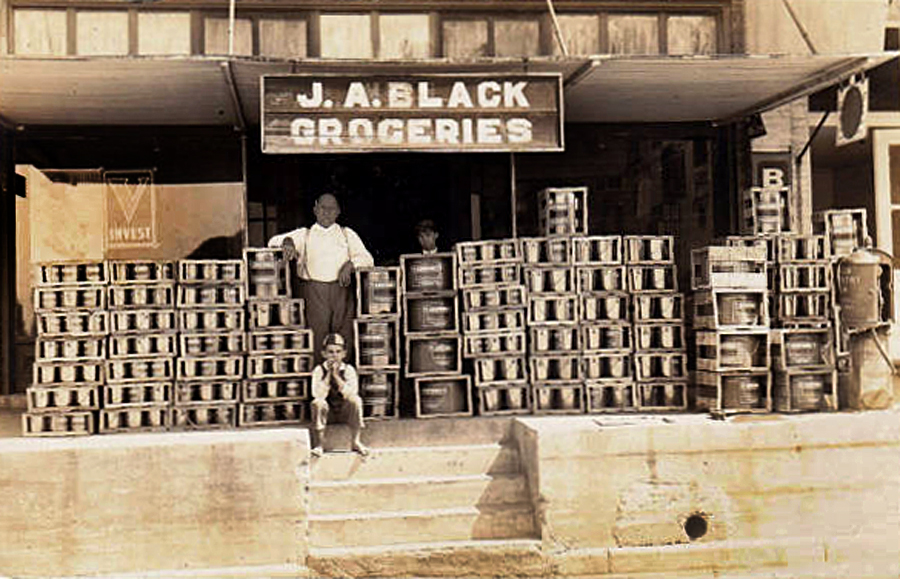
The only hotel in town when Mr. Thornton came to Mr. Pleasant was the old Main Hotel which was located where West’s Department Store is now.
C. O. Lide and Lilienstern’s had Dry Good’s Stores here. Joe Badt had one, too. Next to where the old First National Bank was used to be old man M. J. Wallace and his two nephews had a drug store there. Swint and Fleming had a drug store where Glynn’s Western Wear is today.
Mr. Thornton remembers one of the greatest men in Titus County was George Baker. He had an unusual thing, back in those days they weren’t like they are now. He had a room in his house and nobody ever slept in that bed except a white man. One time, Mr. Thornton and Jim Warwick went out to George Baker’s house at White Oak to go squirrel hunting. They got into such a haste to get there, that Mr. Thornton got out there without his shotgun. So “Uncle” George let him use his shotgun. A single-barrel that would shoot all right, but when you got ready to reload you had to take your knife and pry the shell out. Yes, “Uncle” George Baker was a great feller. Mr. Thornton says that there never was a man white or black that lived in Titus County that was ever any better than George Baker.
He also remembered “Uncle” Jim Rivers. He was an ex-slave. When Mr. Thornton was a kid growing up he got in the back of “Uncle” Jim’s wagon and gave him two different times, two of the biggest apples that you ever saw. But he was not like “Uncle” George in the respect that “Uncle” George had a lot of property and “Uncle” Jim didn’t have a thing.
They used to have an old black man, Mac Turner that worked for the family and he whipped Mr. Thornton more times than his mama and daddy both did together when he was growing up. He told a funny incident that happened. In 1900 old Mac was plowin’ in a sugar cane patch and Mr. Thornton asked him to dig him up a stalk of that cane and old Mac wouldn’t do it, he had been told not to. So Mr. Thornton got mad and kept throwing clods of dirt at him. They had some great big ol’ mules and they were as wild as a buck, hard to hold. He tied a mule to a persimmon tree and got him a limb offa there and whipped him good! So they went on up to the house and Mac told Mr. Thornton’s mother what had happened and she was a little-bitty old woman and then she whipped him good, too!
They had a big ol’ #4 syrup mill and ground about twice as much as they could use around here. (This was in Camp County). 0l’ Mac had a brother named Jeff who was sort of a preacher. He always made their syrup and so did a white feller named King. So they had a hole about 5 or 6 feet deep and a foot wide to throw their skimmings in. So Mr. Thornton’s father and a bunch of other men got a barrel full of those skimmings and stuff and made some beer out of it. Well, somebody got to drinking and left the gate open to the fence and there was about a 450-500 lb. hog come in there and he drank that stuff up and got drunk and all at once he squealed real loud and fell over sideways and commenced to kicking. So a man ran down there to the spring and got a couple of buckets of water and threw it on the hog and he got up and squealed again and that’s the only time Mr. Thornton ever saw one go in the right direction. He made a bee-line for the gate and his daddy turned that barrel over and they got rid of them skimmings real quick!

In the 1940’s it began to be rumored around. Mt. Pleasant that the land where the Dellwood Park is today was going to be developed into a housing sub-division. For years the people of Mt. Pleasant had wanted this property for park purposes. However, this dream was not realized until 1947 when Mr. Thornton put on a one man campaign which, after much effort on his part, resulted in the purchase of this property by the Chamber of Commerce and the City for park purposes. Had it not been for the efforts of P. D. Thornton, the City might never have had this park.

